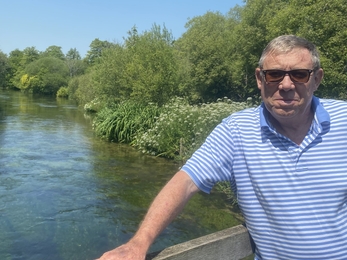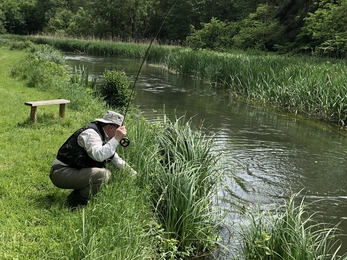I first went fishing when I was five. My paternal grandfather was an excellent fisherman, as were my parents. However, living in the midlands at the time, there were no brown trout or grayling. Instead, it was coarse fishing in canals, ponds, lakes, and rivers, and many of the latter were still polluted in those days. I started fly fishing in 1980, but that was mostly in lakes or reservoirs, with an occasional trip to the rivers of the Welsh borders.
My first encounter with a Hampshire chalk stream was in 1968. My parents and I were going to watch a football game in Southampton, and I caught sight of the River Test as I crossed the bridge by the Mayfly Pub. I had read all the chalk stream fly fishing books, courtesy of my local library, but this was my first contact with one.
I remember that I felt so excited to see a chalk stream in real life - even just a glimpse of it. On the way home, I persuaded my parents to stop briefly at Romsey, purely so I could have a walk along the river to Sadler’s Mill. I can still recall, to this day, being taken aback by the clarity of the water and all the fish visible within it.
In May 1989, I finally had the chance to fish in a chalk stream - the River Wylye in Wiltshire. I can still picture it vividly: clear water with lots of ranunculus, lots of insects, and lots of fish. Although the fishing wasn't easy, it was just as I had visualised it when I read those fishing books many years before. I have lived in Hampshire for 35 years now, and remain a very keen trout, grayling, and salmon fisherman.
I used to have a high-pressure job as an IT director, and fishing was a way of getting away from it all. Even just a few hours in the evening was hugely beneficial as stress relief. Now, in my retirement, I have the time to fish a lot more, and every visit is just as enjoyable. You never stop seeing interesting things and making fresh observations. Very often, just sitting and watching is as good as the fishing itself.



